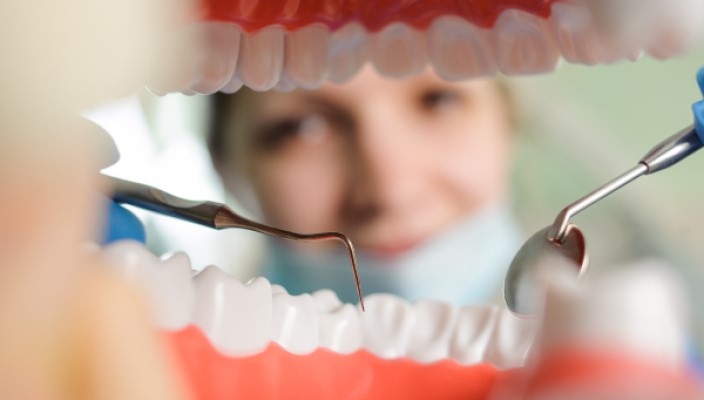Treat Gum Disease With Dental Deep Cleaning

In its earliest stage, gum disease — also known as periodontal disease — is reversible with a professional dental deep cleaning. Gum disease is an infection of the gums that, if left untreated, can result in bone and tooth loss. Addressing the issue before it has a chance to progress to this point is crucial to sustaining overall dental health.
Understanding gum disease
Gum disease is often the result of poor oral hygiene or neglect. Regular brushing and flossing are essential to removing harmful bacteria from the tooth’s surface and for keeping this bacteria from affecting the gumline. If a person fails to maintain the most basic oral hygiene tasks, bacteria can begin to build up below the gumline. Over time, the bacteria become plaque, and eventually, plaque calcifies into a substance called tartar.
While brushing and flossing can remove bacteria and plaque buildup, the processes cannot get rid of tartar. To free the teeth of tartar accumulation, a dentist must perform a dental deep cleaning that entails scraping the tartar from the tooth’s surface via a two-step process.
Treating gum disease with dental deep cleaning
The sooner a patient undergoes a deep cleaning, the better. Tartar buildup can eventually lead to painful inflammation of the gums that, if left untreated, can result in periodontitis. Periodontitis is a more advanced form of the disease that results in the weakening and deterioration of the gums and jawbone. Once gum disease progresses to this point, tooth loss is a possibility. To minimize this prospect, a dentist will begin by performing the two-step deep cleaning procedure.
The first step involves scaling, which is the process of removing the tartar accumulation from the tooth’s surface both above and below the gumline. The dentist will use a special tool to reach beneath the gumline all the way to the bottom of the tooth’s pocket.
Planing is the second step. Root planning occurs when the dentist smooths out the tooth roots to help the gums reattach themselves to the teeth. Many patients require two or more visits to complete the entire deep cleaning process. A local anesthetic is often required.
Caring for the teeth after the deep cleaning process
It is not uncommon for patients to experience minor pain, discomfort, and sensitivity in the days following a dental deep cleaning. Individuals may also experience tenderness, swelling, and bleeding for up to a week post-treatment.
Despite the adverse side-effects, it is essential that patients care for the teeth in the days following treatment, and that they follow doctor’s orders closely. The treating dentist may recommend foods and beverages to eat, as well as ones to avoid. To prevent infection, the dentist may also prescribe a medication in the form of a rinse or a pill.
Finally, the dentist will likely schedule follow up appointments to see how a patient’s oral health is progressing. To ensure optimal health in the future, patients should honor the follow-up schedule.
Conclusion
Dental deep cleaning is a necessary part of gum disease treatment. This non-invasive procedure can potentially reverse gum disease and save your teeth.
Request an appointment here: https://www.aboutdentalcare.com or call About Dental Care at (435) 359-0147 for an appointment in our St. George office.
Check out what others are saying about our dental services on Yelp: Dental Cleaning and Examinations in St. George, UT.
Recent Posts
A deep dental cleaning is often necessary when plaque and tartar build up below the gum line, causing a relatively severe case of gum disease. A deep dental cleaning can significantly improve long-term periodontal health, which reduces the risk of tooth loss or gum and bone complications. The purpose of a deep dental cleaning is to…
Fluoride is an all-around defense for your teeth, gums, and whole mouth. This is why many towns add the mineral to drinking water as a matter of public health. Dentists also use fluoride treatments to protect their patients’ teeth from tooth decay.Read on for a brief walkthrough of how fluoride protects the teeth at a…
A general dentist shared some ways to help prevent bad breath. This is a topic no one wants to discuss. Bad breath happens to everyone at one point or another. If you take proper precautions, you can avoid having bad breath. We should openly talk about this taboo topic. The more we talk about it, the…
Your general dentist is here to provide some information about how to best take care of your teeth. Dental health and hygiene are essential to the overall health and wellness of your body. Without healthy teeth and gums, you will be unable to take in the nutrients and proteins necessary for your body to thrive…


